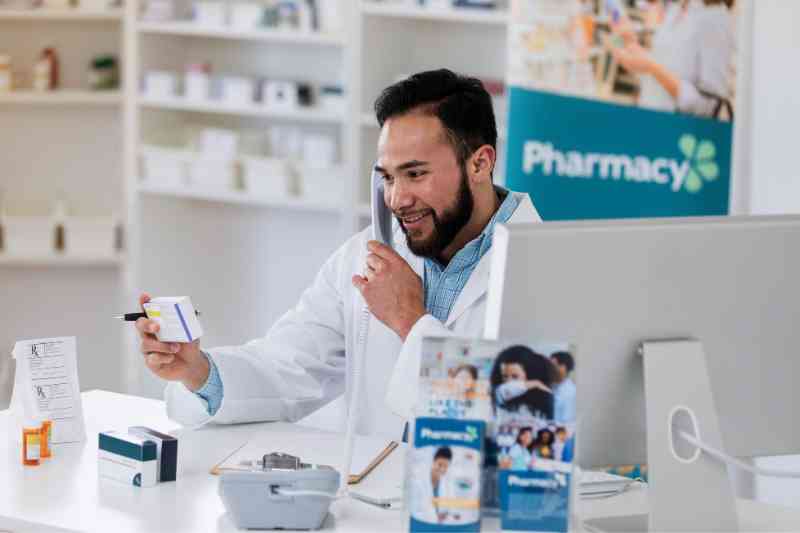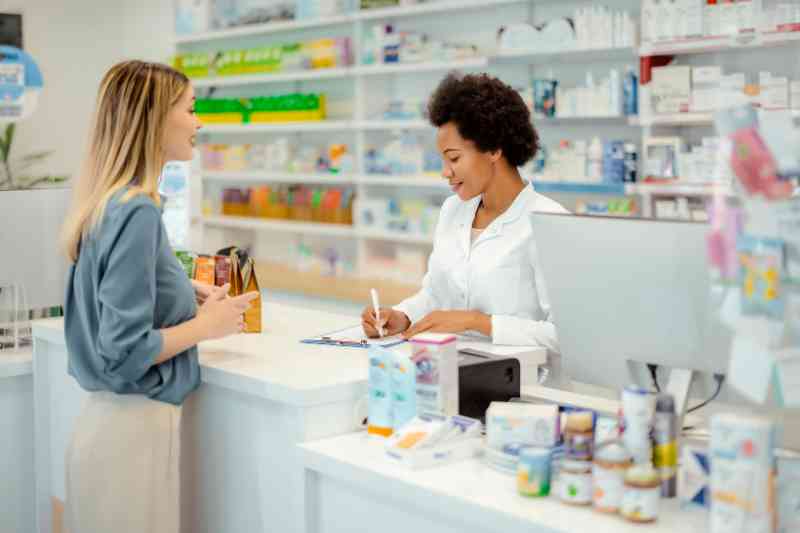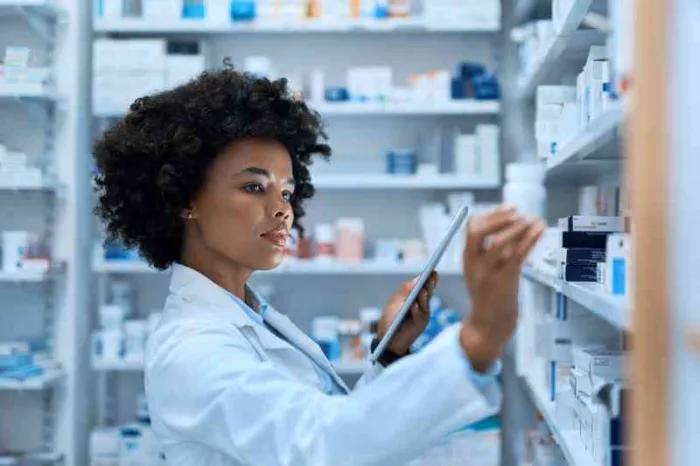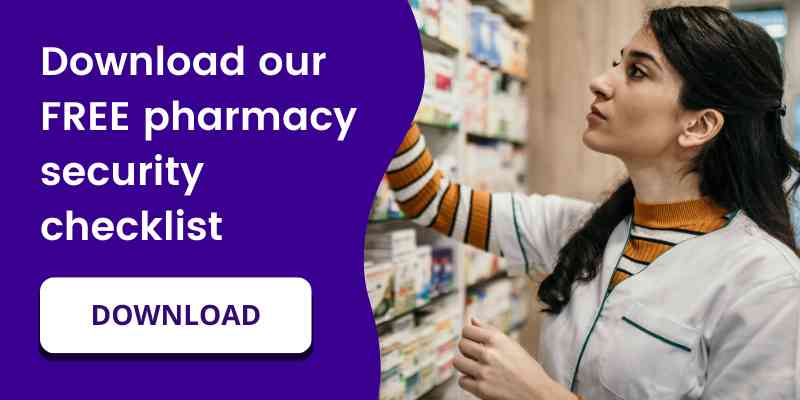Key takeaways
- The most important security requirements for pharmacies are access control, security cameras, and alarm systems.
- Pharmacies’ most common safety issues are exposure to chemicals, cybersecurity threats, and workplace accidents.

Securing your property with hospital access control is the first line of defense at pharmacies, hospitals, and medical facilities. As a result, pharmacy security systems have emerged as a comprehensive way to enhance security while streamlining access for authorized individuals.
This blog explores our top picks of the three best pharmacy security systems. Then, take a deep dive into common security requirements at pharmacies.
In this post, we cover:
- 3 best pharmacy security systems
- What are the security requirements in a pharmacy?
- What are safety issues in a pharmacy?
- Pharmacy security systems FAQs
3 best pharmacy security systems
We know how important it is to choose the right pharmacy security system to protect your pharmacists, staff, and customers. So, join us in taking a closer look at the best pharmacy security companies.
Based on our research, here are our picks of the best pharmacy security systems companies:
1. ButterflyMX
Offering a property-wide solution, ButterflyMX is the best access control system for your pharmacy.
In fact, ButterflyMX offers the following access control features:
- Video intercom. Get crystal-clear clarity of everyone who enters your property with a 156° wide-angle lens. As a result, this enhances security by empowering you to visually verify patients and staff before granting them access to certain areas.
- Keypads. Wondering how to protect inventory and sensitive material at your pharmacy? Secure your storage rooms, pharmaceutical inventory, and sensitive medical documents with our state-of-the-art keypad.
- Audit logs. In the event of a security incident, view easily accessible time- and date-stamped photos of everyone who enters your facility for peace of mind.
- Front desk station. Looking to modernize your reception area? Seamlessly manage visitor communications and streamline access to your facility right from your front desk.
- Vehicle access control. Our vehicle readers and windshield tags empower you to streamline vehicle access at your pharmacy’s parking garage, lot, or drive-thru. Thus, only authorized vehicles can use your parking facilities.
- Mobile management. Manage, control, and grant access to your property remotely. Additionally, manage multiple locations from a single platform.
Watch how ButterflyMX works:
2. Pavion
Providing sophisticated electronic security for commercial spaces, Pavion offers round-the-clock monitoring. So, your pharmacy stays protected throughout the day and night.
To illustrate, here’s what Pavion offers:
- Cybersecurity. Mitigate data breaches with vigilant cybersecurity measures that are designed to protect your web databases.
- Thermal imaging. With thermal imaging, detect intruders quickly and easily — even in dark environments.
- Weapon detection. With this purpose in mind, integrate cutting-edge weapon detection systems to protect patients and staff at your pharmacy.
- Patient wandering system. Given this point, real-time location systems are designed to easily locate patients at hospitals if they happen to get lost or disoriented. As a result, enhancing safety and security in hospitals.
- Fire alarm system. For this purpose, send mass notifications in the event of a fire-related emergency.
3. Everon
Everon offers commercial security, fire, and life safety solutions designed to heighten your pharmacy’s security.
With this in mind, here are some key features of Everon:
- Intrusion alarms. With this in mind, Everon offers a commercial burglar alarm system that’s designed to protect your pharmacy from break-ins.
- Fire and life safety. With Everon, your pharmacy can employ a comprehensive fire safety system that includes fire sprinklers, smoke detectors, fire alarms, and more.
- Customer engagement platform. To illustrate, empower patients to securely submit and pay invoices without putting their information at risk.
- Environmental and temperature monitoring. Monitor, measure, and report excess levels of water, gas, smoke, flame, heat, and more.
What are the security requirements in a pharmacy?
Pharmacy security requirements encompass various components, including access control, alarm systems, and security cameras. These systems work in tandem to ensure that unauthorized users don’t tamper with inventory or access sensitive medical information.
Let’s take a closer look into the security requirements at pharmacies:
- Access control. Manage access to sensitive areas at your pharmacy with keycards, keypads, mobile access control, or biometric systems.
- Security cameras. For example, install indoor and outdoor CCTV cameras to monitor activities and deter unauthorized visitors.
- Alarm systems. Deploy alarm systems that alert the proper authorities in the event of emergencies.
- Secure medication storage. Utilize safes, package rooms, cabinets, or automated dispensing systems to securely store and manage pharmaceutical inventory.
- Verify prescriptions. Implement a reliable process for verifying the authenticity and validity of prescriptions to prevent prescription fraud and unauthorized medication dispensing.
- Emergency communication systems. Panic buttons enable rapid response in the event of emergencies or security breaches.
- Legal and regulatory compliance. Adhere to relevant laws, regulations, and industry standards.
- Conduct regular security audits. Conduct routine security assessments and audits to identify vulnerabilities and address weaknesses proactively.

What are safety issues in a pharmacy?
Proactively mitigating safety risks at your pharmacy is key to protecting your staff and customers. So, join us in uncovering common safety issues in pharmacies.
Based on our research, here are the most common safety issues in pharmacies:
- Exposure to chemicals. Pharmacists are regularly exposed to chemicals. So, it’s important to have appropriate safety measures in place, like goggles and gloves.
- Employee safety. Staff members may encounter volatile situations when dealing with difficult or aggressive customers.
- Cybersecurity threats. Pharmacies store sensitive patient information, making them susceptible to data breaches and cyberattacks.
- Workplace accidents. Accidents such as slips, trips, and falls can occur in pharmacies. Ergonomic hazards like cuts from using sharp instruments or opening bottles are also common in pharmacies.
- Medication errors. Errors in dispensing medications can result in patient harm and compromise the reputation of your pharmacy.
Pharmacy security systems FAQs
Here are some commonly asked questions about pharmacy security systems:
- How much do pharmacy security systems cost?
- What is surveillance in a pharmacy?
- What are the security measures necessary in a pharmacy?
How much do pharmacy security systems cost?
On average, pharmacy security systems cost $1,000 to $2,500 for security hardware. What’s more, professional installation and activation usually range from $300 to $500. Additionally, round-the-clock alarm monitoring typically costs between $40 and $120.

What is surveillance in a pharmacy?
Surveillance in pharmacies helps pharmacists and other clinicians monitor the conditions of patients. Moreover, it provides valuable insights and information on drug utilization and resistance. Pharmacy surveillance technology also offers analytics and reporting capabilities.
What are the security measures necessary in a pharmacy?
Access control, alarm systems, and surveillance cameras are the most common security measures in pharmacy security policies and procedures.







